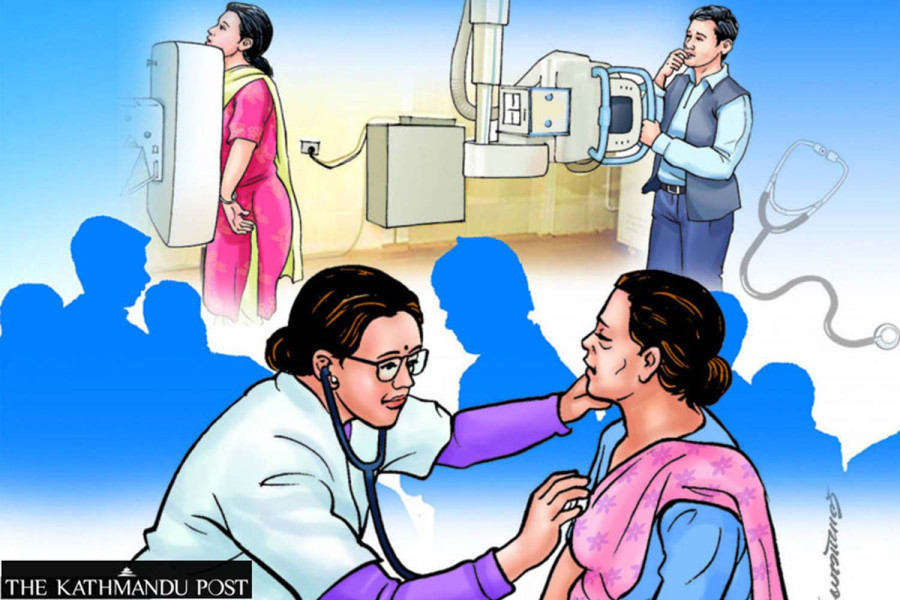Health
Nepal plans nationwide screening for non-communicable diseases from new fiscal year
Officials say they have proposed allocating a budget at all 753 local units to screen for diabetes, high blood pressure, kidney disease, and body mass index.
Post Report
The Ministry of Health and Population plans to carry out screening for non-communicable diseases at all 753 local units across the country from the fiscal year 2025-26, in a bid to make people aware of the growing burden of such diseases.
For that, officials have proposed allocating a budget to all local units and districts.
“We have proposed to allocate a nominal budget to all districts and local units to carry out screening of non-communicable diseases,” said Dr Pomawati Thapa, chief of the Non-communicable Disease and Mental Health Section at the Epidemiology and Disease Control Division. “We hope that provincial governments and local units will also contribute to the budget.”
Non-communicable diseases—hypertension, diabetes, renal disease, liver problems, heart problems, and cervical cancer, among others—have emerged as major killers in recent years, accounting for around 71 percent of total deaths.
According to a 2019 study on the prevalence of non-communicable diseases by the Nepal Health Research Council, 71 percent of total deaths at present were due to non-communicable diseases, and an additional eight percent of deaths were linked to injuries.
A recent report published in The Lancet, a leading international medical journal, warned that half of Nepal’s adult population will be overweight or obese by 2050.
Thapa said that the purpose of nationwide screening for basic non-communicable diseases is to raise people’s awareness of the rising burden of deadly diseases.
“The burden of these problems can be reduced if they are diagnosed in the initial stage,” said Thapa. “Many people in our country do not even get their blood pressure checked. People usually know about their disease conditions when the problems become severe.”
A recent study carried out by the Health Department under the Kathmandu Metropolitan City uncovered a growing health crisis among the city's residents.
According to the preliminary report, 39 percent of the population aged 30 and above in Kathmandu Metropolitan City suffers from high blood pressure or hypertension, a condition in which an individual’s blood pressure remains elevated over time.
It is an established risk factor for ischemic heart disease (also known as coronary heart disease), stroke, and kidney disease.
Of those suffering from high blood pressure, 13 percent were unaware of their condition, and around three percent were not taking medications despite knowing their health problems.
Those who are not taking any medications despite knowing are young people who think that they can handle the problem by controlling their diet and exercise. They also worry about high treatment costs.
Health screening was conducted on 26,019 people in December and January from 256 locations in the metropolis, including 32 urban health promotion centres. Tests were conducted for blood pressure levels, diabetes, behavioural risk factors—smoking and alcohol intake—and renal function.
Likewise, five percent of people in the metropolis were newly diagnosed with diabetes, while 14.5 percent of those who underwent testing said that they already had the disease. Officials say another 2.4 percent of people were found not taking medications despite knowing that they have high blood sugar levels, and the reason is the same—young people who think that they can control the problems by changing their diet and exercising regularly, and those who are worried about high medical bills. Altogether, 22 percent of the metropolis's residents above 30 are diabetic, according to the report.
Doctors say changes in dietary patterns, such as increased consumption of processed foods, sedentary lifestyles, and rising stress levels, are among the culprits for the rise in the burden of non-communicable diseases.
They say that most patients suffering from non-communicable diseases seek treatment when the problems worsen, and in many cases, it is too late.
“If the problems are identified at an initial stage, complications can be prevented, and prevention costs far less than treatment,” said Thapa. “Making people aware of the seriousness of the problems is the first step in lessening the disease burden, and we have planned to start by carrying out a nationwide screening.”
Public health experts say it is high time to focus on non-communicable diseases, as their prevalence has risen alarmingly. They said many lives could be saved if testing for non-communicable diseases were made free. Along with free testing, authorities should focus on behavioural changes—improvements in eating habits and physical exercise, among other things, experts say.




 14.12°C Kathmandu
14.12°C Kathmandu














